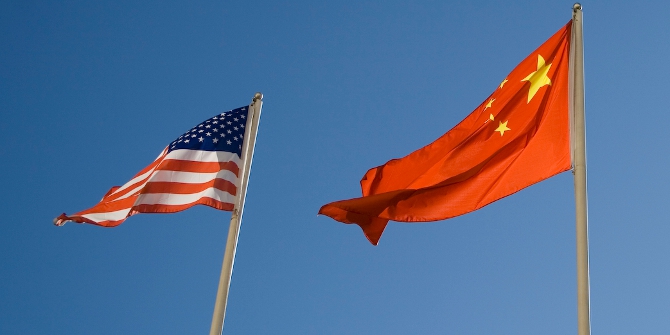 At the beginning of 2015 we asked Stephanie Rickard, Associate Professor in the LSE’s Department of Government, for her predictions for the year. Now, she reflects on her prognostications on US trade policy and on what 2016 may have in store.
At the beginning of 2015 we asked Stephanie Rickard, Associate Professor in the LSE’s Department of Government, for her predictions for the year. Now, she reflects on her prognostications on US trade policy and on what 2016 may have in store.
2015 was a good year for trade negotiators. One of the biggest deals in decades was successfully concluded in October when twelve countries signed the Trans-Pacific Partnership (TPP) agreement which covers nearly 40 percent of global GDP.
At the start of this year, I argued that aid packages, like the United States’ Trade Adjustment Assistance (TAA) program, play an important role in successful trade deals. TAA programs provide financial support to workers who lose their jobs or see a reduction in their wages due to increased trade. These types of support measures can help to reduce opposition to foreign trade. Certainly, US legislators seem to think so.
My analysis of US Congressional roll call votes reveals that pro-trade legislators who represent relatively more exporters are more likely to vote for TAA funding. In other words, legislators whose constituents have the most to gain from trade are precisely the ones most likely to support Trade Adjustment Assistance. Even Republicans, who often oppose government spending and assistance programs, are willing to support TAA programs when a large portion of their constituents stand to gain from trade. Legislators’ voting behaviour suggests that TAA helps to widen support for trade.
Yet, in 2015, TAA proved to be more of a stumbling block than a stepping stone. In June, a majority of Democrats in the House of Representatives voted against TAA. They did so in an attempt to derail “fast-track” authority, which would effectively shut down TPP negotiations. Fast-track authority allows the President to negotiate trade deals on which Congress can then only vote yes or no. Without fast-track authority, many believe President Obama would have found it difficult to successfully conclude TPP negotiations.
TAA not only failed to quell opposition in this case, it may have even exacerbated tensions by creating further cleavages in an already divided legislature. In the end, however, Democrats backed down and Congress agreed to fund TAA until 2022.
TAA may yet help to ease the passage of TPP in Congress when it comes to a vote next year. Legislators cannot amend the agreement, because of the fast-track authority they granted President Obama in 2015. But Congress can and will scrutinize the agreement closely and ultimately decide if the US is to be part of it.
While potentially helpful politically, TAA is not a silver bullet. TAA programs cannot assuage all opponents of ambitious trade deals like TPP or the Transatlantic Trade and Investment Partnership (TTIP). Concerns over data protection, intellectual property rights, and systems for settling disputes between nations and foreign companies cannot be alleviated by traditional Trade Adjustment Assistance. In this way, the 50 year old TAA program is beginning to show its age. Today’s trade agreements are deeper and more complex than historic agreements. Modern agreements, like TTIP, typically include a wide range of economic issues, many of which go far beyond the traditional barriers to trade. The more ambitious trade agreements become, the harder they will be to agree.
Featured image credit: peoplesworld (Flickr, CC-BY-NC-2.0)
Please read our comments policy before commenting.
Note: This article gives the views of the author, and not the position of USAPP – American Politics and Policy, nor the London School of Economics.
Shortened URL for this post: http://bit.ly/1OkQHVp
_________________________________
 Stephanie Rickard – LSE Government
Stephanie Rickard – LSE Government
Stephanie Rickard is an Associate Professor of Political Science at the LSE’s Government Department. Her research examines the effects of political institutions on economic policies.






